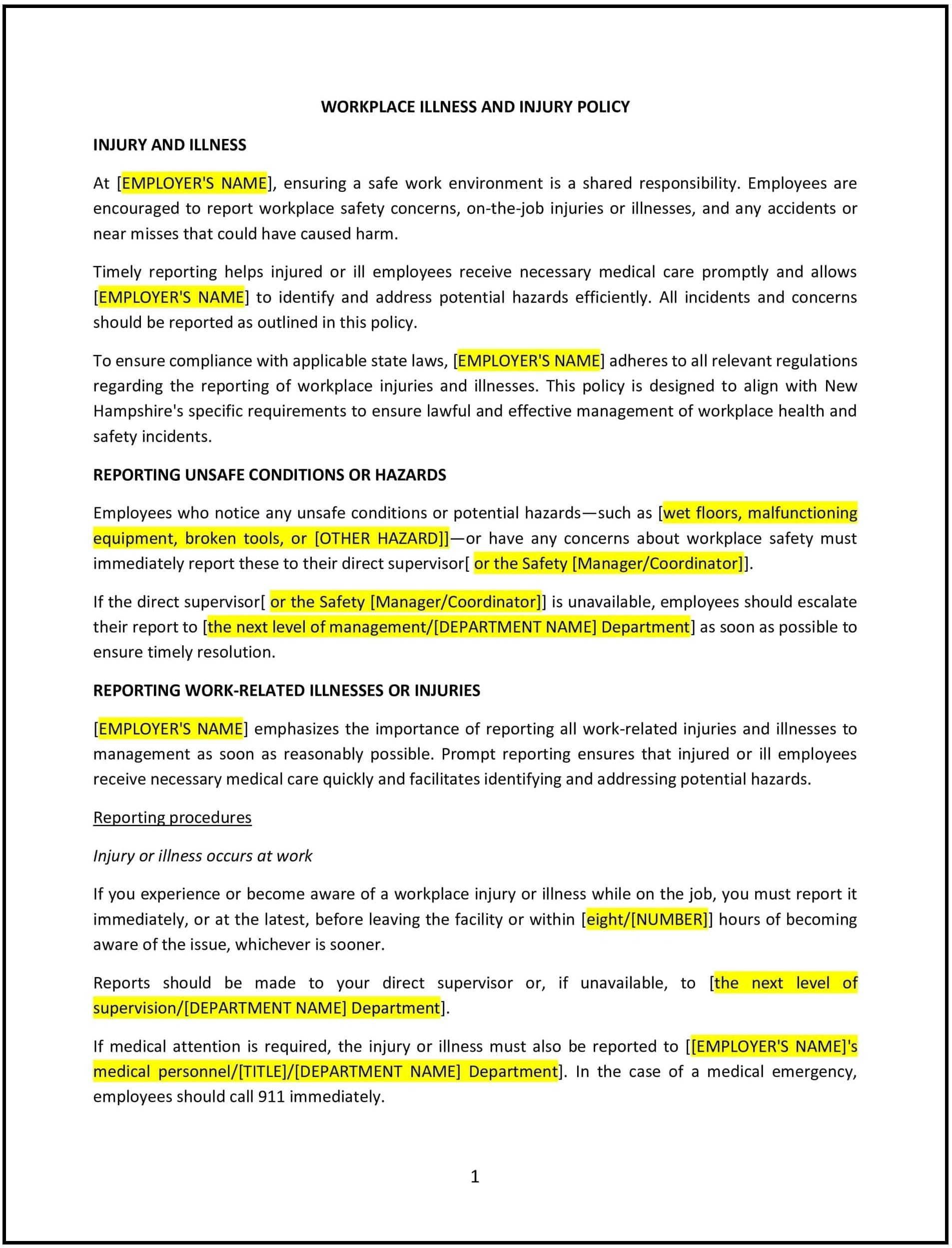Workplace illness and injury policy (New Hampshire): Free template
Got contracts to review? While you're here for policies, let Cobrief make contract review effortless—start your free review now.

Customize this template for free
Workplace illness and injury policy (New Hampshire)
A workplace illness and injury policy helps New Hampshire businesses establish clear guidelines for addressing workplace-related illnesses and injuries. The policy outlines how employees should report injuries or illnesses, the procedures for providing medical treatment, and how workers’ compensation is handled. It also specifies the company’s commitment to ensuring a safe work environment and supporting employees who are impacted by illness or injury.
By implementing this policy, businesses can create a safe and supportive work environment while protecting both employees and the company from the financial and legal risks associated with workplace illnesses and injuries.
How to use this workplace illness and injury policy (New Hampshire)
- Define workplace illness and injury: Clearly define what constitutes an illness or injury under the policy, including physical injuries, occupational diseases, and any other health-related incidents that occur in the workplace.
- Establish reporting procedures: Specify how employees should report illnesses or injuries, including the timeframes for reporting, the format of the report (e.g., written, verbal), and the person or department to contact.
- Provide medical treatment guidelines: Outline the procedures for seeking medical treatment, including who is responsible for making arrangements and what types of treatment will be covered.
- Address workers’ compensation: Explain the workers’ compensation process, including how employees can file claims, what benefits are available, and how claims will be managed.
- Outline return-to-work procedures: Define the process for employees returning to work after an illness or injury, including any requirements for medical clearance and accommodations that may be needed.
- Offer support and accommodations: Provide information on accommodations available to employees with ongoing health conditions, such as modified duties or flexible schedules, to facilitate their return to work.
- Ensure confidentiality: Emphasize the importance of confidentiality in handling health-related information and ensuring that medical records and reports are kept private.
- Encourage workplace safety: Implement proactive measures to minimize the risk of injury or illness in the workplace, such as safety training, regular risk assessments, and the use of protective equipment where necessary.
- Review and update: Regularly review and update the policy to reflect changes in state laws, business needs, or best practices related to workplace health and safety.
Benefits of using this workplace illness and injury policy (New Hampshire)
This policy provides several benefits for New Hampshire businesses:
- Promotes employee well-being: By clearly defining how illnesses and injuries should be handled, businesses can ensure that employees are supported and treated fairly when they are sick or injured.
- Reduces legal risk: A well-documented policy helps businesses comply with state workers’ compensation laws and minimizes the risk of legal claims related to workplace illnesses or injuries.
- Enhances workplace safety: Proactively addressing potential health and safety risks helps create a safer work environment, reducing the likelihood of workplace injuries and illnesses.
- Improves employee morale: Employees who know they will receive support and accommodations in case of illness or injury are more likely to feel valued and committed to the organization.
- Reduces absenteeism: By providing clear procedures and support for return-to-work transitions, businesses can help employees recover and return to work sooner, reducing prolonged absenteeism.
Tips for using this workplace illness and injury policy (New Hampshire)
- Communicate the policy effectively: Ensure all employees are aware of the workplace illness and injury policy, including the procedures for reporting illnesses or injuries and the support available to them.
- Provide training: Regularly train employees on safety procedures, first aid, and how to prevent common workplace injuries. This proactive approach can help minimize the occurrence of workplace illnesses and injuries.
- Offer flexibility for recovery: When employees return to work, offer flexible scheduling or modified duties if needed, to help employees fully recover while resuming their responsibilities.
- Track incidents: Maintain a record of workplace injuries and illnesses to monitor trends, address potential safety concerns, and comply with reporting requirements.
- Review safety practices regularly: Conduct periodic safety audits and risk assessments to identify areas where safety can be improved to prevent future injuries or illnesses.